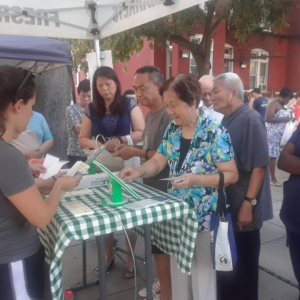
Healthy food advocacy nonprofit D.C. Greens organizes programs to develop urban agriculture and combat food insecurity in D.C.
Washington, D.C. lawmakers are neglecting the city’s problems with food insecurity, said Lauren Shweder Biel, executive director and co-founder of a healthy food advocacy nonprofit, at an event at the Georgetown Alumni House Oct. 25.
Biel directs D.C. Greens, a nonprofit organization based in D.C. that aims to bring healthy food to poorer communities in the District through various programs. The programs include agricultural education in schools; Produce Plus, which offers additional financial assistance to people already using federal benefits like the Supplemental Nutrition Assistance Program; and Produce RX, which helps subsidize medical and nutrition services. D.C. Greens also advocates for urban agriculture.
Biel currently serves on D.C.’s Healthy Youth and Schools Commission and the D.C. Department of Health’s Diabesity Committee. She began advocating for better food access in 2009, when she co-founded D.C. Greens.
Food insecurity is a term developed by the U.S. Department of Agriculture that describes a situation in which people struggle to access food that allows them to lead healthy lives, according to The Washington Post.
The Capital Area Food Bank found that 14.5 percent of D.C. residents are food insecure. A 2016 Georgetown University Student Association survey found that 54 percent of the 351 students surveyed experienced food insecurity often at least once a week.
Food insecurity goes hand in hand with poverty: Black people living in D.C. experience poverty and food insecurity at a disproportionately higher rate than white people living in D.C, according to The Washington Post.
The problem of food insecurity in D.C. often gets overlooked, Biel said.
“Our politicians here, our society here, you know, spend a lot of time talking about housing, education, workforce development, and food has not been something that is seen as a key issue for the city,” Biel said. “A lot of what we are doing is working across all these different sectors to really elevate food so that it is a key issue in the city.”
D.C. Greens leads advocacy efforts by encouraging people from marginalized communities in the District to speak up about the issue of food insecurity; however, according to Biel, the complaints of people experiencing food insecurity are often ignored.
“What we saw a lot of times is, you know, people come who have a little experience with food insecurity, and when they speak, you know, if they say anything wrong, if they get any little thing wrong, the people in power are just like, ‘Well, they don’t really understand the conditions that we’re working [with],’” Biel said.
D.C. Greens works with D.C. Public Schools to encourage community-based change in school food systems and to make D.C. residents aware of the connection between food and a healthier life, according to Biel.
“We are partnering with D.C. Public Schools to build out their school food advisory board, to really create channels for parents, and teachers, and students to really be able to give feedback in a safe way to the school systems, so that they can start making changes to the school food based on community interest,” Biel said.
Biel attributed Produce Plus’ success to its inclusion of members of the communities that the program aims to assist in its advocacy work.
“I believe that one of the reasons why Produce Plus has been as successful as it is is because we have very intentionally created community ownership model inside of the program design,” Biel said. “We work with close to 300 volunteers every season. We call them our farmers market brigade.”
Nonprofits must go beyond simply assisting a community by establishing self-sufficiency in those communities, Biel said.
“Nonprofits need to shift the system; if the thing can’t operate without you, you didn’t shift the system,” Biel said.
There are still many challenges to overcome before the problem of food insecurity will be fully resolved, according to Biel. However, community efforts can bring the change needed to expand access to healthy food for all District residents.
“Everything we are trying to do here at D.C. Greens is to bring folks together and say, ‘Enough. We can do better. We need to do better. We have to do better,’” Biel said. “How are we going to do better from where we stand?”




















